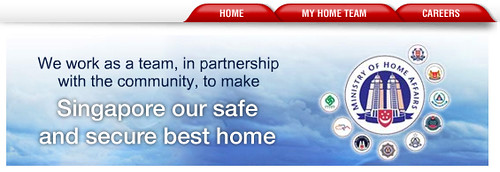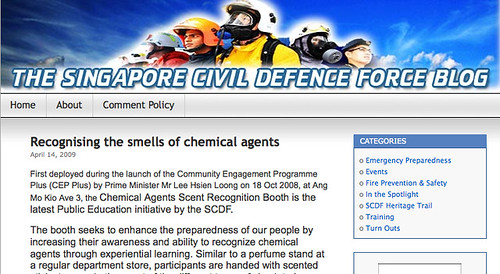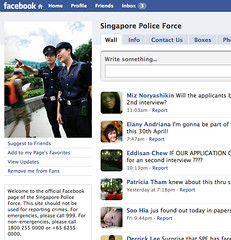SINGAPORE: The Internet has made possible the rapid spread of fear in a crisis, said Deputy Prime Minister and Home Affairs Minister Wong Kan Seng.Read the full article, here.
But he said bloggers and website moderators can help ease public concerns should a terrorist attack occur...
Since October 2007, 75 of them have visited the Home Team Academy and the Civil Defence Academy to get an understanding of emergency preparedness and counter-terrorism activities.
Very interesting.
If not for the CNA report, I'd never have guessed the Ministry of Home Affairs (who has oversight on the Home Team Academy and Civil Defence Academy) has engaged 75 bloggers and website moderators since late 2007.
I wonder who are those 75 people were (and did they blog about it?)

Home Team agencies exploring New Media
I know Home Team agencies like the Singapore Civil Defence Force has a blog:

And the Singapore Police Force now has a Facebook Page:

(Btw I think their FB page is pretty engaging as it is, with people posting comments and questions. So I don't think they need a blog anymore, heh. However, they do need to provide regular responses to the questions posted at the FB page! Some are very legitimate questions whose answers I'd find useful also.)
Anyway, the CNA report says to me the Ministry of Home Affairs is pretty progressive in terms of "new media engagement". They're not just publishing stuff but setting up platforms and face-to-face engagement opportunities.
Those MHA agencies obviously recognise the value of blogs and bloggers in legitimate information dissemination.
Thinking aloud: How to engage for the purpose of crisis communications
If I were in MHA and had to organise such blogger networking sessions, I'd only invite bloggers who are willing to identify themselves. It's OK not to reveal their real names on their blogs but at least they should identify themselves to MHA (if the choose to take up the invitation).
But at some level, they cannot choose to remain anonymous.
In crisis communications, credibility is crucial.
If verification of identities is needed for particular situations, I think it's fair for MHA to list the blogs they may deem as trusted on the MHA website. A disclaimer can be stated to say that MHA has no control over what is posted, but these bloggers have been briefed at some point.
Going back to the CNA article, the minister was quoted as saying, "On the ground... ...grassroots networks are also important."
I agree.
And if we use the civic grassroots analogy, it's about cultivating relationships.
No agency can simply tell bloggers what to publish. Doesn't work that way.
At least, agencies can let partners have the information. Then it's largely trusting they will pass on the message without distortion (there are ways to ensure information integrity, like providing an official page with the source information).
What I think it means is that ultimately, mutual trust and respect will be key in a crisis. That trust and respect can only be cultivated during times of non-crisis.
Does this means the Home Team now have regular "Engage the bloggers" networking sessions?
Would be good if they do.

Very interesting indeed! The internet co-opting has begun officially.
ReplyDelete